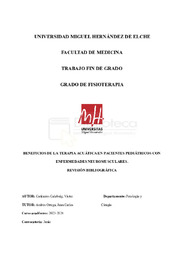Please use this identifier to cite or link to this item:
https://hdl.handle.net/11000/33536Full metadata record
| DC Field | Value | Language |
|---|---|---|
| dc.contributor.advisor | Andrés Ortega, Juan Carlos | - |
| dc.contributor.author | Cañizares Calabuig, Víctor | - |
| dc.contributor.other | Departamentos de la UMH::Patología y Cirugía | es_ES |
| dc.date.accessioned | 2024-10-16T12:29:23Z | - |
| dc.date.available | 2024-10-16T12:29:23Z | - |
| dc.date.created | 2024-05-26 | - |
| dc.identifier.uri | https://hdl.handle.net/11000/33536 | - |
| dc.description.abstract | Introducción: Las enfermedades neuromusculares se caracterizan por afectar a algún elemento que forma la unidad motora deteriorando a la persona de forma progresiva, afectando a varias áreas o sistemas del cuerpo. Por otro lado, la terapia acuática es un tipo de rehabilitación que mediante características tanto físicas como mecánicas proporcionan efectos en el sistema cardiovascular, renal, respiratorio, neuromuscular y músculo-esquelético. Objetivos: El principal objetivo es evaluar los beneficios que nos aporta la terapia acuática sobre la calidad de vida, observando a su vez los efectos que produce, si este tipo de terapia la podemos considerar una terapia única o es complementaria al trabajo en tierra y si los efectos son sostenibles a largo plazo. Material y métodos: Se realizó una búsqueda a través de diferentes bases de datos como son PubMed, PEDro, Scielo, ENFISPO, IBECS y ScienceDirect. Resultados: Se obtuvieron un total de 8 artículos de los cuales, 3 artículos están enfocados en la Distrofia muscular de Duchenne(DMD), 3 artículos en la Atrofia Muscular Espinal (AME), uno en un síndrome post-poliomielitis y por último un estudio que muestra diferentes patologías neuromusculares. Conclusiones: Se ha observado que existen mejoras de todos los aspectos que engloba la calidad de vida, mejorando la fuerza, flexibilidad y resistencia al ejercicio. Por otro lado, no previene las deformidades, se considera una terapia complementaria a la terrestre y no podemos garantizar que los beneficios sean sostenibles a largo plazo. | es_ES |
| dc.description.abstract | Introduction: Neuromuscular diseases are characterized by affecting some element that forms the motor unit, progressively deteriorating the person, affecting several areas or systems of the body. Furthermore, aquatic therapy is a type of rehabilitation that through both physical and mechanical characteristics provide effects on the cardiovascular, renal, respiratory, neuromuscular and musculoskeletal systems. Objectives: The main objective is to evaluate the benefits that aquatic therapy brings us on quality of life terms, observing in turn the effects it produces, if it can serve as a standalone therapy or if it is more effective as a complement to traditional therapy and if the effects are sustainable in the long term. Material and methods: Research was conducted through different databases including PubMed, PEDro, Scielo, ENFISPO, IBECS and ScienceDirect. Results: Eight articles were reviewed, of which 3 articles are focused on Duchenne Muscular Dystrophy (DMD), 3 articles in Spinal Muscular Atrophy (AME), one in a post-poliomyelitis syndrome and finally a study that shows different neuromuscular pathologies. Conclusions: Aquatic therapy has shown to improve quality of life by enhancing strength, flexibility and resistance to exercise. However, it does not prevent deformities, it is considered a complementary therapy to terrestrial therapy and we cannot guarantee that the benefits will be sustainable in the long term. | es_ES |
| dc.format | application/pdf | es_ES |
| dc.format.extent | 40 | es_ES |
| dc.language.iso | spa | es_ES |
| dc.publisher | Universidad Miguel Hernández | es_ES |
| dc.rights | info:eu-repo/semantics/openAccess | es_ES |
| dc.rights | Attribution-NonCommercial-NoDerivatives 4.0 Internacional | * |
| dc.rights.uri | http://creativecommons.org/licenses/by-nc-nd/4.0/ | * |
| dc.subject | Terapia acuática | es_ES |
| dc.subject | Fisioterapia | es_ES |
| dc.subject | Rehabilitación | es_ES |
| dc.subject | Calidad de vida | es_ES |
| dc.subject | Enfermedades neuromusculares | es_ES |
| dc.subject.other | CDU::6 - Ciencias aplicadas | es_ES |
| dc.title | Beneficios de la terapia acuática en pacientes pediátricos con enfermedades neuromusculares. Revisión bibliográfica | es_ES |
| dc.type | info:eu-repo/semantics/bachelorThesis | es_ES |

View/Open:
TFG Cañizares Calabuig, Víctor.pdf
867,83 kB
Adobe PDF
Share:
.png)
